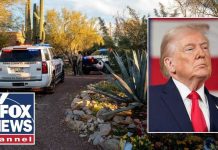
Boxing legend Mike Tyson takes a knockout stance against fentanyl, partnering with the DEA to warn Americans that “One pill can kill” as the nation battles a devastating opioid crisis claiming thousands of lives.
Key Takeaways
- Mike Tyson has joined forces with the DEA to raise awareness about the deadly dangers of fentanyl, visiting their NYC lab alongside US Attorney Alina Habba.
- Nearly 70% of recent US overdose deaths are attributed to illegally manufactured fentanyls, with New York City alone reporting nearly 2,200 fatal overdoses last year.
- Tyson, now a cannabis entrepreneur, emphasized the contrast between regulated products and dangerous street drugs while wearing a DEA lab coat to examine seized substances.
- The boxing icon leveraged his personal history with substance abuse to deliver a powerful message about drug safety and his nine-year sobriety journey.
- Habba has launched a “strike force” targeting manufacturers and smugglers of fentanyl and similar synthetic opioids crossing the border.
Tyson Teams Up With Law Enforcement to Fight Fentanyl
Former heavyweight boxing champion Mike Tyson has stepped into a new ring, joining the Drug Enforcement Administration to combat America’s devastating fentanyl epidemic. Donning a blue DEA lab coat, Tyson visited a DEA laboratory in New York City to witness firsthand the dangerous substances being seized from American streets. The visit was part of a campaign to spread awareness about the lethal consequences of fentanyl, a synthetic opioid responsible for thousands of American deaths annually. Tyson was accompanied by Alina Habba, the acting US Attorney for New Jersey, who has recently launched a specialized “strike force” targeting manufacturers and smugglers of fentanyl and similar deadly opioids.
“One pill can kill,” said Mike Tyson, former heavyweight boxing champion.
The Deadly Reality of America’s Opioid Crisis
The collaboration comes amid alarming statistics showing that nearly 70% of recent overdose deaths in the United States can be attributed to illegally manufactured fentanyls. New York City alone reported approximately 2,200 fatal overdoses last year, highlighting the urgency of the crisis. During his DEA lab tour, Tyson examined a variety of seized substances, including marijuana, psychedelic mushrooms, fentanyl bricks, and counterfeit prescription medications. Of particular concern were fake Adderall pills laced with methamphetamine and a fentanyl brick containing carfentanil, a substance even more potent than fentanyl itself. The display underscored the campaign’s central message about the unpredictability and danger of street drugs.
“There is a real toxic problem, and that’s the truth of it,” said Alina Habba, acting US Attorney for New Jersey.
From Personal Struggles to Public Advocacy
Tyson’s involvement in the anti-fentanyl campaign carries particular weight given his own history with substance abuse. The boxing legend has been open about his past struggles with illicit drugs and proudly noted during the DEA visit that he has maintained sobriety for the past nine years. This personal journey adds credibility to his advocacy work and allows him to connect with those who might be vulnerable to drug abuse. Tyson’s transformation from troubled athlete to advocate represents a powerful redemption story that resonates with many Americans who have witnessed the destructive impact of addiction, either personally or through loved ones.
“We have kids where they take a pill from God knows where or smoke a vape or take a gummy and they don’t know where it came from and next thing you know you are on the floor because of that little piece of fentanyl,” said Alina Habba, acting US Attorney for New Jersey.
Cannabis Entrepreneur Advocates for Regulated Products
In an interesting juxtaposition, Tyson now operates as a successful cannabis entrepreneur, marketing products including “Mike Bites,” THC-infused gummies shaped like an ear in reference to his infamous 1997 fight with Evander Holyfield. During the DEA visit, Tyson emphasized the stark contrast between regulated cannabis products and dangerous street drugs, highlighting that his business prioritizes safety through proper testing and regulation. This distinction underscores a key message of the campaign: the critical importance of knowing exactly what substances are being consumed. While Tyson and Habba may hold differing views on marijuana policy, they stand united on the paramount importance of drug safety.
“There is nothing worse than losing a kid,” said Rick Harrison, “Pawn Stars” host who lost his son to fentanyl.
Tyson’s collaboration with the DEA exemplifies how public figures can leverage their influence to address critical public health issues. By joining the fight against fentanyl, the boxing legend is using his platform to potentially save lives by raising awareness about the lethal consequences of opioid abuse. As the nation continues to grapple with a drug crisis that shows few signs of abating, such partnerships between celebrities and government agencies may prove instrumental in reaching vulnerable populations with lifesaving information. The message is clear and urgent: in today’s dangerous drug landscape, even a single mistake can prove fatal.









